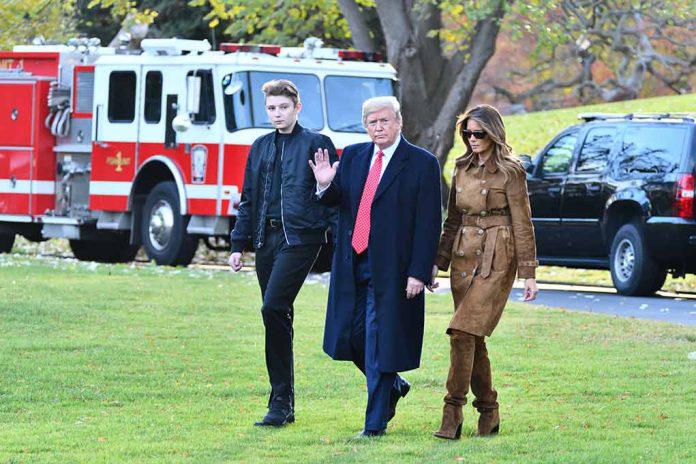
Barron Trump, son of former President Donald Trump, was denied a bank account due to his family name, revealing the far-reaching consequences of cancel culture in America.
At a Glance
- Melania Trump claims her son Barron was denied a bank account due to political discrimination
- The incident occurred shortly after the Trumps left the White House in early 2021
- Melania criticizes the expanding influence of “cancel culture” on corporations and institutions
- The former First Lady highlights how cancel culture has impacted her family’s personal and professional lives
Cancel Culture Hits Home: Barron Trump’s Banking Woes
In a shocking revelation, former First Lady Melania Trump has disclosed that her son, Barron Trump, was denied a bank account due to what she describes as political discrimination. This incident, occurring shortly after the family’s departure from the White House in early 2021, underscores the pervasive reach of cancel culture into the personal lives of public figures and their families.
Melania Trump, in her memoir titled “Melania,” expresses her dismay at the situation, stating, “I was shocked and dismayed to learn that my long-time bank decided to terminate my account and deny my son the opportunity to open a new one.” This decision, which Melania attributes to political bias, raises serious concerns about civil rights violations and the extent to which cancel culture has infiltrated major institutions.
Melania Trump claims Barron was refused a bank account because of ‘cancel culture’ https://t.co/J6H7st19oo
— Independent US (@IndyUSA) October 9, 2024
The Expanding Reach of Cancel Culture
The former First Lady’s experience with her son’s banking difficulties is just one example of what she describes as a broader trend of cancel culture in America. Melania writes, “The ‘cancel mob’ now includes corporations, traditional media, influential social media figures, and cultural institutions. This disheartening trend reflects the current socio-political landscape in the United States.”
Melania’s observations highlight a concerning trend where political affiliations can lead to discrimination in various aspects of life, from banking to business opportunities. This raises important questions about the fairness and inclusivity of our society, especially when it comes to individuals associated with controversial political figures.
Impact on Charitable Efforts and Personal Initiatives
The effects of cancel culture on the Trump family extend beyond banking issues. Melania reveals that her charitable efforts and personal initiatives have also been impacted. Her Fostering the Future scholarship program faced setbacks when a tech-education company ended their partnership after her involvement was publicized. Additionally, a foster care event she was scheduled to attend was canceled due to harassment from media and social media activists, ultimately affecting the foster children who would have benefited from the event.
These incidents paint a picture of how cancel culture can hinder even well-intentioned charitable efforts, raising questions about the broader societal impact of such practices. It’s crucial to consider whether this approach is truly beneficial for society or if it’s creating more division and preventing positive initiatives from reaching those in need.
Looking Forward: Barron’s Resilience and the Need for Reflection
Despite the challenges faced by the Trump family, there are positive notes. Melania reports that Barron, now attending New York University, is thriving in his new environment. “He loves his classes and his professors,” Melania said. “He’s doing well, he’s thriving and he’s enjoying to be in New York City again.” This resilience in the face of adversity is commendable and shows that even in the midst of cancel culture, individuals can find ways to succeed and grow.
As we reflect on the experiences shared by Melania Trump, it’s essential to consider the broader implications of cancel culture on our society. While holding public figures accountable is important, we must question whether denying basic services like banking to family members of political figures crosses a line. The story of Barron Trump’s banking difficulties serves as a stark reminder of the need for a more nuanced approach to political disagreements and a reevaluation of how we treat individuals associated with controversial public figures.






















